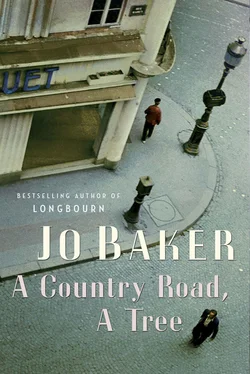Another pause. “Mine also.”
“Well, until we are more at our leisure, then.”
“Yes,” Jimmy says. “Until then.”
“Goodbye,” he says. “Good luck.”
He sets the mouthpiece down on the stand, rests his forehead against the panel above. He lets a breath go. Then he fumbles in his pocket for more change. He begins again to dial.
—
He closes the apartment door behind him and it is sugar-glass. It is barely there at all.
“Suzanne?” He hears the shake in his own voice.
She clips down the steps from the mezzanine, her coat on, piled clothing in her hands, shopping bag on her shoulder. No time for courtesies, endearments. She sets the folded clothes on the arm of the sofa, says, “Where’s your bag?”
“Eh?”
“You know, that dreadful old satchel thing of yours.”
He finds it — he didn’t know she didn’t like it — hanging on a peg underneath his other jacket. He hands it to her. She slides his manuscript from the drawer into the bag.
“I was too late,” she says over her shoulder.
“What?”
“They’ve got Hélène.” She turns back to him. Her eyes are brimming, but she is still all briskness. “The Geste were there, in her apartment, when I arrived.”
“Jesus.”
He moves towards her; she just shoves his bag into his hands.
“But they let you go…,” he says.
“I played the innocent. I said I had called round to see about her cat.”
“Oh God, that bloody cat.”
She lifts the pile of clothing from the arm of the settee. “I sorted this for you. Underwear, sweater, shaving gear.”
“Thanks.” He just stands there, holding his bag in a bundle, feeling the weight of his manuscript.
“Clothes. Now. Please.”
Yes. Of course. He opens up the bag so that she can stuff them in.
“Are you going to be all right in those boots?” she asks.
He glances down at them. “The others are worse.”
“Right then. Well. They’ll have to do. Come on.”
He follows her out on to the landing. He fumbles with his keys, turns back to the door. He locks up. His hand shakes. His face feels tight and hard. He wonders if they will ever be here again. They head down the stairs. Brisk, light, but deliberately not running. They might pile straight into the Gestapo coming up to find them. They must not look as though they are trying to escape.
“We’re popping out for a stroll, we’ll stop at a café,” she says back over her shoulder. “Tell yourself it’s an ordinary day.”
Their hands skim down the bannister.
“Where will we go?” he asks. “Do you have any notion?”
“A friend of mine; he’ll help us.”
“What friend?”
Even in all this, that little sour twist of jealousy. They’re in the lobby. She drops her voice still further, speaks over her heaving breath.
“You’ve met him, at those evenings. Michel. You remember?”
He shakes his head. Maybe.
“It’s what he does. He helps people.”
Right. He holds the porte cochère, peers out. The street is clear. She ducks through; he follows. He offers his arm and she takes it. The door slams shut behind them on the lobby and the staircase spiralling up seven floors to the flimsy door locked on silent space and the dust falling on books, and on the floorboards, and on the heavy dark hand-me-down table that Nora Joyce had given him, on Mein Kampf and his battered coffee pot and his ashtray dusted with tobacco ash, and the drooping canvas tent and the Turkish rug.
They walk along the street together, their arms linked, carrying shopping bag and satchel, as ordinary as the day itself. They don’t know where they’re going, but they go.
CHAPTER TEN PARIS, August 1942
The grandfather clock ticks. One weight sinks, its chain mumbling through blunt teeth, teasing cogs around. Somewhere in its innards something clunks and shifts, and it begins to chime the quarter-hour.
Which makes it a quarter past three.
He fans his toes, flexes his ankles.
Which makes it a quarter past three, on Friday, the twenty-first of August, nineteen forty-two.
If the clock is right.
He rolls his head softly side-to-side. He can still make these small movements. And while he can, it seems important that he does. When he turns his head to the left, there is light pouring down through a knothole, and beyond it shafts through the gaps between the boards, where sometimes dust too falls in tiny streams. When he turns to the right, there is a black rectangular patch over the floorboards, and this is the rug, which covers the loosened planks where they can clamber out, at those times when they can be out. There is all this, and there is the old man lying next to him.
He’s got used to the various and mingled smells by now. The old man’s and his own. He barely notices the body odour, the bad breath — it’s only when one of them lets out a particularly rancid fart — bad food, and the acid from not having enough of even bad food that makes your stomach eat itself and turns your guts to treacle — that a smell is particularly noticeable. Interesting, to see what one can become accustomed to.
The old man has an enviable capacity for sleep. His breast, under his white beard, falls and rises softly. His face is fascinating: the way the skin slides from his cheekbones and forehead and gathers in concertinas at his ears, leaving the skull visible at the eye sockets and the bridge of the nose. Raising his head a little, he can peer down the length of their parallel bodies and see the old man’s feet, bootless, one yellow toe poking through a grey sock.
Sometimes the old man snores. He lets him snore and does not nudge him.
He can himself, sometimes, if he’s very lucky, drift out of consciousness for a bit. A swooping fall, a card-sharp rush of images, one replacing the other before any single one of them can be understood. Then he’s jerked back, blinking at the boards above his head.
He raises his shoulders to his ears, the blades sliding up the boards beneath him and back down again, like failing wings.
It is not so bad, not really. It is not so bad.
Sometimes, when the old man is awake, he combs his beard with his fingers and mutters to himself. He’s Russian. What he’s saying could be prayers, or he could be telling stories, or he could simply be reminding himself of better days. But the old man has a listener, alert for patterns, names, anything familiar, trying to pin the sounds down into sense.
He is learning Russian in the gap between the ceiling and the floor.
It is not going quickly.
But then there is no rush.
It is a relief when the old man starts up his muttering. It helps to pass the time.
Other things are passed too, down there between the ceiling and the floor. A bottle stands between them. She leaves it down there empty, retrieves it once it has been used. One unbuttons one’s fly and shuffles about and inches up on elbows and pisses with great difficulty, while the other fellow turns his head away, or is, often enough, already asleep. He finds that, all in all, he feels fondly towards the old fellow. He is a gracious pisser and a courteous sleeper; he does not fart as much as might be supposed. If one must have company, this is not bad company to have.
There are also hours spent in the house itself, with the wireless on, the wife and husband home and nobody else expected. The old man sits in the corner by the grandfather clock, and he himself, a fifth wheel, tries to stay out of the way as well as stay away from the windows. This is when the day is done, the shops downstairs empty, and it is to be expected that there will be people at home. Even the slightest out-of-the-ordinary occurrence is questionable now. It only takes a word from a concerned citizen about strangers in the building, or figures moving around a supposedly empty apartment, and they are done for.
Читать дальше










